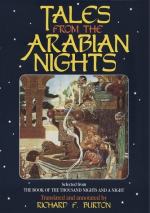[FN#112] i.e. Le Roi Crotte.
[FN#113] This seems to be a punning allusion to Baghdad, which in Persian would mean the Garden (bagh) of Justice (dad). See “Biographical Notices of Persian Poets” by Sir Gore Ouseley, London, Oriental Translation Fund, 1846
[FN#114] The Kardoukhoi (Carduchi) of Xenophon; also called (Strabo xv.) “Kardakis, from a Persian word signifying manliness,” which would be “Kardak"=a doer (of derring do). They also named the Montes Gordaei the original Ararat of Xisisthrus-Noah’s Ark. The Kurds are of Persian race, speaking an old and barbarous Iranian tongue and often of the Shi’ah sect. They are born bandits, highwaymen, cattle-lifters; yet they have spread extensively over Syria and Egypt and have produced some glorious men, witness Sultan Salah al-Din (Saladin) the Great. They claim affinity with the English in the East, because both races always inhabit the highest grounds they can find.
[FN#115] These irregular bands who belong to no tribe are the most dangerous bandits in Arabia, especially upon the northern frontier. Burckhardt, who suffered from them, gives a long account of their treachery and utter absence of that Arab “pundonor” which is supposed to characterise Arab thieves.
[FN#116] An euphemistic form to avoid mentioning the incestuous marriage.
[FN#117] The Arab form of our “Kinchin lay.”
[FN#118] These are the signs of a Shaykh’s tent.
[FN#119] These questions, indiscreet in Europe, are the rule throughout Arabia, as they were in the United States of the last generation.
[FN#120] Arab. “Khizab” a paste of quicklime and lamp-black kneaded with linseed oil which turns the Henna to a dark olive. It is hideously ugly to unaccustomed eyes and held to be remarkably beautiful in Egypt.
[FN#121] i.e. the God of the Empyrean.
[FN#122] A blow worthy of the Sa’alabah tribe to which he belonged.
[FN#123] i.e. “benefits”; also the name of Mohammed’s Mu’ezzin, or crier to prayer, who is buried outside the Jabiah gate of Damascus. Hence amongst Moslems, Abyssinians were preferred as mosque-criers in the early ages of Al-Islam. Egypt chose blind men because they were abundant and cheap; moreover they cannot take note of what is doing on the adjoining roof terraces where women and children love to pass the cool hours that begin and end the day. Stories are told of men who counterfeited blindness for years in order to keep the employment. In Moslem cities the stranger required to be careful how he appeared at a window or on the gallery of a minaret: the people hate to be overlooked and the whizzing of a bullet was the warning to be off. (Pilgrimage iii. 185.)




